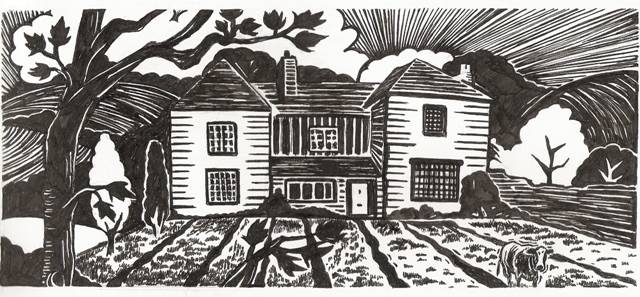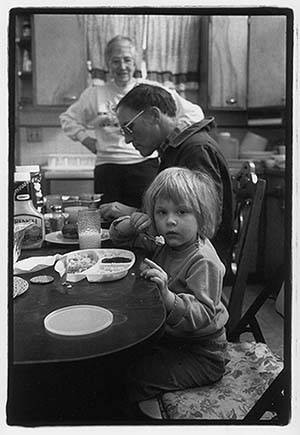 Each year, St. Jude Catholic Worker House in Champaign has shut down for the month of August to make repairs and reopen in September. However, recent events in Champaign have created a perfect storm for the organization’s homeless clients. The house was not able to open yesterday and when it does reopen at month’s end it will do so without its soup kitchen program, formerly the only one serving Champaign-Urbana.
Each year, St. Jude Catholic Worker House in Champaign has shut down for the month of August to make repairs and reopen in September. However, recent events in Champaign have created a perfect storm for the organization’s homeless clients. The house was not able to open yesterday and when it does reopen at month’s end it will do so without its soup kitchen program, formerly the only one serving Champaign-Urbana.
The soup kitchen was just one of the outreach activities of the Worker House, whose volunteers have provided food, shelter, and compassion to anyone who needed it for the last 28 years. “We operate on the premise that we are all personally responsible for our neighbors,” says treasurer Leigh Estabrook.
Economic decline and a lack of city and state funding for various homeless service programs have left organizations like the Worker House straining at the seams.
Beginning three years ago, the organization, which operates from an older home at 317 South Randolph Street, saw the number of community members using its soup kitchen double to over 100 and sometimes more.
 At the same time, the amount of affordable low income housing in Champaign-Urbana also declined. This occurred via closures like that of Gateway Studios due to landlord default, as well as via city policies that allow landlords to discriminate against those using federal subsidized housing funds. So, when homeless community members organized as Safe Haven sought refuge, the Worker House opened its backyard to allow their tent encampment.
At the same time, the amount of affordable low income housing in Champaign-Urbana also declined. This occurred via closures like that of Gateway Studios due to landlord default, as well as via city policies that allow landlords to discriminate against those using federal subsidized housing funds. So, when homeless community members organized as Safe Haven sought refuge, the Worker House opened its backyard to allow their tent encampment.
That is until neighbors complained and the City of Champaign intervened. On June 30, the Worker House was subject to what was supposed to be a routine fire code inspection. However, what occurred was a broader more detailed inspection with multiple inspectors. The city required the resulting code violations be corrected by August 3 lest the house be condemned. Meanwhile, city zoning administrators told the residents of Safe Haven that they had to be off the property by July 17 or face fines of $750 per day.
“The inspections were necessary to ensure the safety of those served by the organization,” says Estabrook. “We try to keep on top of things, but inevitably in a volunteer organization, some things slip through the cracks.” Estabrook adds that the Worker House is indebted to David McCourt, Denny Hutton, and other volunteers from First Presbyterian, as well as volunteers from the local Mennonite church and A.J. Bailey who donated their labor, and in some cases materials, to correct the violations. With the violations corrected, the Worker House hopes to be able to resume sheltering homeless persons by month’s end. Just how many will be able to be sheltered remains unknown, she says.
Meanwhile, the members of Safe Haven are being sheltered by St. Mary’s church in Champaign for at least another week.
The outcome for the Worker House’s soup kitchen also is uncertain.
Ironically, the Worker House has been able to feed its increasing clientele with fewer funds thanks to the work of its approximately 100 volunteers and Cliff Maduzia who manages the Susan Freiburg Memorial Food Surplus Program. The program works with local restaurants, caterers, and stores to help secure food donations.
However servicing the program’s growing clientele out of the Worker House was viewed by officials as a violation of fire codes and by neighbors as problematic. Rather than turn people away, the program is now organized separately as the Daily Bread Soup Kitchen. The soup kitchen volunteers are working with New Covenant Fellowship in Champaign to distribute sack lunches beginning September 2. New Covenant was the only one of thirteen churches that agreed to allow the program to distribute food on its property.
Daily Bread volunteers are continuing to explore options for a permanent kitchen to serve daily hot meals. “Pending the success of the sack lunches, we are hoping to be able to use crockpots to at least distribute soup from New Covenant in the near future,” says volunteer Ellen McDowell.
The Worker House will try to coordinate with Daily Bread and hopes that Daily Bread volunteers will continue to be involved with Worker House programs, says Estabrook, however, “the division is very sad on many levels.”
Photo by Dave Riecks








